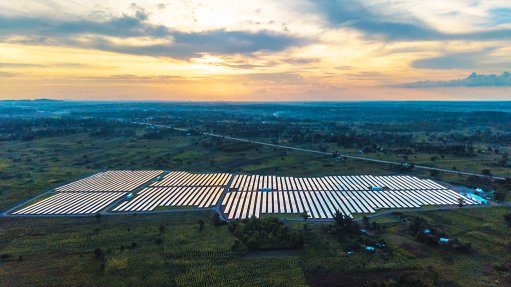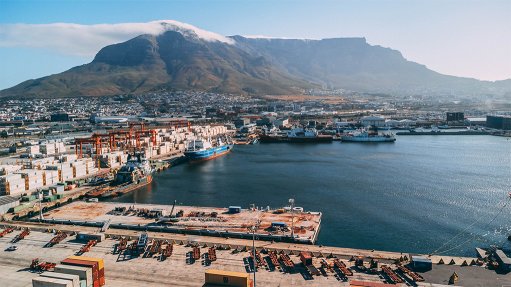Europe confirms ban on CBS-infected citrus imports from South Africa
The instalment of this column published in the October 18 to 24, 2013, edition included two pieces – restrictions on South African citrus exports to Europe and a provisional antidumping duty on coated paper.
As I prepared to write this week’s instalment, contemplating the week that had passed, two issues stood out, namely citrus black spot (CBS) and the conclusion of the antidumping investigation into coated paper and paperboard.
CBS
On February 21, the European Food Safety Authority (EFSA) released a report that declared the measure imposed to prevent the entry of CBS “appropriate”. This is not what South Africa would have wanted – we would have preferred the European Union (EU) loosening the restrictions on citrus exports. According to the report, the existing measures are an effective means of protecting the EU from two serious diseases that attack citrus plants. This is the conclusion reached by the risk assessments carried out by EFSA on phyllosticta citricarpa, the organism that causes CBS, and xanthomonas citri, which causes citrus canker. Both pathogens present a risk to the EU citrus industry because host plants are present in Europe and the environmental conditions in the region are favourable. The EFSA indicated that the two pathogens were currently not present in the EU and both were subject to control measures aimed at preventing their entry into the region.
The European Commission directorate-general for health and consumer affairs now has to decide on the practical implications of the report, but the interception of shipments is unlikely to be stopped.
Coated Paper Antidumping Investigation
On February 21, the International Trade Administration Commission of South Africa (Itac) published the final determination on the investigation into the alleged dumping of coated paper, classifiable under tariff heading 48.10, originating in or imported from the People’s Republic of China and the Republic of Korea.
The application was lodged by Sappi Southern Africa and the investigation was initiated on January 25, 2013, with the provisional antidumping measures being imposed on September 27, 2013. After received comments on the provisional determination, Itac informed Trade and Industry Minister Rob Davies that the product was not being dumped on the Southern African Customs Union market. Davies approved Itac’s recommendation.
Gypsum Plasterboard Dumping
On February 21, Itac announced the initiation of a sunset review of the antidumping duties on gypsum plasterboard, classifiable under tariff subheading 6809.11, originating in or imported from Indonesia and Thailand. (In last week’s edition, I wrote that the antidumping duties were set to expire, unless a sunset review investigation was initiated by March 14.)
On June 26, 2013, Itac published a notice to the effect that, unless a substantial request was made indicating that the expiry of the antidumping duties would lead to the recurrence of dumping and material injury, the antidumping duties would be withdrawn.
On September 19, 2013, a response was received from Saint Gobain Constructions Product, while a letter of support was received from the other manufacturer of gypsum plasterboard, Lafarge Gypsum South Africa.
Comment is due by March 31.
Vitreous Enamels Tariff
On February 21, Itac notified of the proposed increase in the rate of customs duty on vitreous enamels, classifiable under tariff subheading 3207.20, from free of duty to 10% ad valorem by the creation of an additional eight-digit tariff subheading, namely 3207.20.XX (vitrifiable enamels and similar preparations, as well as vitrifiable glazes, engobes, or slips, and similar preparations.
Vitreous enamel, also known as porcelain enamel, is a material made by fusing powdered glass to a substrate by firing, usually at between 750 ºC and 850 ºC. At this tempera- ture, the powder melts, flows and then hardens to a smooth, durable vitreous coating on metal, glass or ceramic material.
The application was lodged by Ferro Industrial Products, which argued that it was experiencing increasing competition from imports, predominantly from Turkey, and that these imports landed at prices far below local prices and, in some cases, below international prices. The applicant believed it faced the risk of closure because of an unrelenting loss of market share. As the company was the sole producer of vitreous enamels locally, the market would be forced to import its enamel requirements.
Comment is due by March 21.
EU GSP Comment
On February 21, the South African Revenue Ser- vice published notes on the revised European Union Generalised System of Preferences (GSP), which excludes South Africa from preferential tariffs and the alternative arrangements effective January 1. On February 19, the South African Revenue Service published draft customs and excise rules pertaining to the termination of the EU GSP. Comment is due by March 5.
EU/SA GI Protection
The Department of Trade and Industry has invited comments on the 28-member EU request for the prohibition of the use of certain words in connection with any trade, business, profession or occupation, or in connection with a trademark, mark or trade description applied to goods, other than by producers of the goods from the countries indicated in the Government Gazette. Comment was due by March 6.
On February 22, an Information Notice – Public Consultation: Geographical Indications from the Republic of South Africa – appeared in the official journal of the EU. The notice contains a number of wine names, and Honeybush and Rooibos, but Karoo Lamb is absent. As mentioned in an earlier instalment of this column, the protection of Karoo Lamb under the Merchandise Marks Act still has to be effected. Comment is due by April 22.
Wire Ropes and Cables Dumping
Comment on the sunset review of the antidumping duties on wire ropes and cables of a diameter exceeding 32 mm, classifiable under tariff subheadings 7312.10.25 and 7312.10.40, originating in or imported from the UK and Germany, and on stranded wire or a diameter exceeding or equal to 12.7 mm, classifiable under tariff subheading 7312.10.20, originating in or imported from the People’s Republic of China is due by March 10 (with an extension March 24 possible).
Comments
Press Office
Announcements
What's On
Subscribe to improve your user experience...
Option 1 (equivalent of R125 a month):
Receive a weekly copy of Creamer Media's Engineering News & Mining Weekly magazine
(print copy for those in South Africa and e-magazine for those outside of South Africa)
Receive daily email newsletters
Access to full search results
Access archive of magazine back copies
Access to Projects in Progress
Access to ONE Research Report of your choice in PDF format
Option 2 (equivalent of R375 a month):
All benefits from Option 1
PLUS
Access to Creamer Media's Research Channel Africa for ALL Research Reports, in PDF format, on various industrial and mining sectors
including Electricity; Water; Energy Transition; Hydrogen; Roads, Rail and Ports; Coal; Gold; Platinum; Battery Metals; etc.
Already a subscriber?
Forgotten your password?
Receive weekly copy of Creamer Media's Engineering News & Mining Weekly magazine (print copy for those in South Africa and e-magazine for those outside of South Africa)
➕
Recieve daily email newsletters
➕
Access to full search results
➕
Access archive of magazine back copies
➕
Access to Projects in Progress
➕
Access to ONE Research Report of your choice in PDF format
RESEARCH CHANNEL AFRICA
R4500 (equivalent of R375 a month)
SUBSCRIBEAll benefits from Option 1
➕
Access to Creamer Media's Research Channel Africa for ALL Research Reports on various industrial and mining sectors, in PDF format, including on:
Electricity
➕
Water
➕
Energy Transition
➕
Hydrogen
➕
Roads, Rail and Ports
➕
Coal
➕
Gold
➕
Platinum
➕
Battery Metals
➕
etc.
Receive all benefits from Option 1 or Option 2 delivered to numerous people at your company
➕
Multiple User names and Passwords for simultaneous log-ins
➕
Intranet integration access to all in your organisation


















